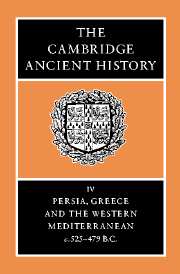Book contents
- Frontmatter
- Contents
- List of maps
- List of text-figures
- List of chronological tables
- Preface
- PART I THE PERSIAN EMPIRE
- PART II THE GREEK STATES
- 4 The tyranny of the Pisistratidae
- 5 The reform of the Athenian state by Cleisthenes
- 6 Greece before the Persian invasion
- 7 Archaic Greek society
- 7a Religion and the state
- 7b The development of ideas, 750 to 500 B.C.
- 7c Material culture
- 7d Coinage
- 7e Trade
- 8 The Ionian Revolt
- 9 The expedition of Datis and Artaphernes
- 10 The expedition of Xerxes
- 11 The liberation of Greece
- PART III THE WEST
- BIBLIOGRAPHY
- Index
- Map 1. The Achaemenid empire
- Map 6. Central Asia
- Map 9. The Black Sea area
- Map 11. Egypt
- Map 13. Greek and Phoenician trade in the period of the Persian Wars
- Map 15. Greece and the Aegean
- Map 18. Northern and Central Italy
- Map 19. Central and Southern Italy
- References
7b - The development of ideas, 750 to 500 B.C.
from 7 - Archaic Greek society
Published online by Cambridge University Press: 28 March 2008
- Frontmatter
- Contents
- List of maps
- List of text-figures
- List of chronological tables
- Preface
- PART I THE PERSIAN EMPIRE
- PART II THE GREEK STATES
- 4 The tyranny of the Pisistratidae
- 5 The reform of the Athenian state by Cleisthenes
- 6 Greece before the Persian invasion
- 7 Archaic Greek society
- 7a Religion and the state
- 7b The development of ideas, 750 to 500 B.C.
- 7c Material culture
- 7d Coinage
- 7e Trade
- 8 The Ionian Revolt
- 9 The expedition of Datis and Artaphernes
- 10 The expedition of Xerxes
- 11 The liberation of Greece
- PART III THE WEST
- BIBLIOGRAPHY
- Index
- Map 1. The Achaemenid empire
- Map 6. Central Asia
- Map 9. The Black Sea area
- Map 11. Egypt
- Map 13. Greek and Phoenician trade in the period of the Persian Wars
- Map 15. Greece and the Aegean
- Map 18. Northern and Central Italy
- Map 19. Central and Southern Italy
- References
Summary
The development of thought and ideas during the period in which the city state came into being, roughly from 750 to 500 B.C., must have been heavily affected by three factors: the continuing influence of the epic tradition, the spread of literacy, and the social, political and economic changes associated with the polis itself. Individuals, too, obviously played their part – poets like Hesiod and Archilochus as well as self-declared sages like the earlier Presocratics. The period was one of major changes in the whole literary and intellectual sphere, beginning as it did with Homer and ending with the rise of philosophy and drama. Accompanying developments in religion and ritual (also treated in Ch. 7a, above) have to be taken into account in attempting to reconstruct the whole intellectual background – a precarious and demanding operation in any event, but valuable if absurdity and one-sidedness can be avoided.
Homer remains influential in different ways throughout, and it is important to begin by establishing what the epic does and does not imply for the intellectual capacity and interests of contemporary audiences. The Iliad seems to have reached something like its present form by around 730 or a little later, the Odyssey by around 700; for it is hard to imagine Hesiod's Theogony as later than about 675, and the Odyssey's language is almost certainly pre-Hesiodic. At all events the Homeric epics came into being, whether or not with some help from writing, when the oral heroic tradition was still in full swing.
- Type
- Chapter
- Information
- The Cambridge Ancient History , pp. 389 - 413Publisher: Cambridge University PressPrint publication year: 1988

